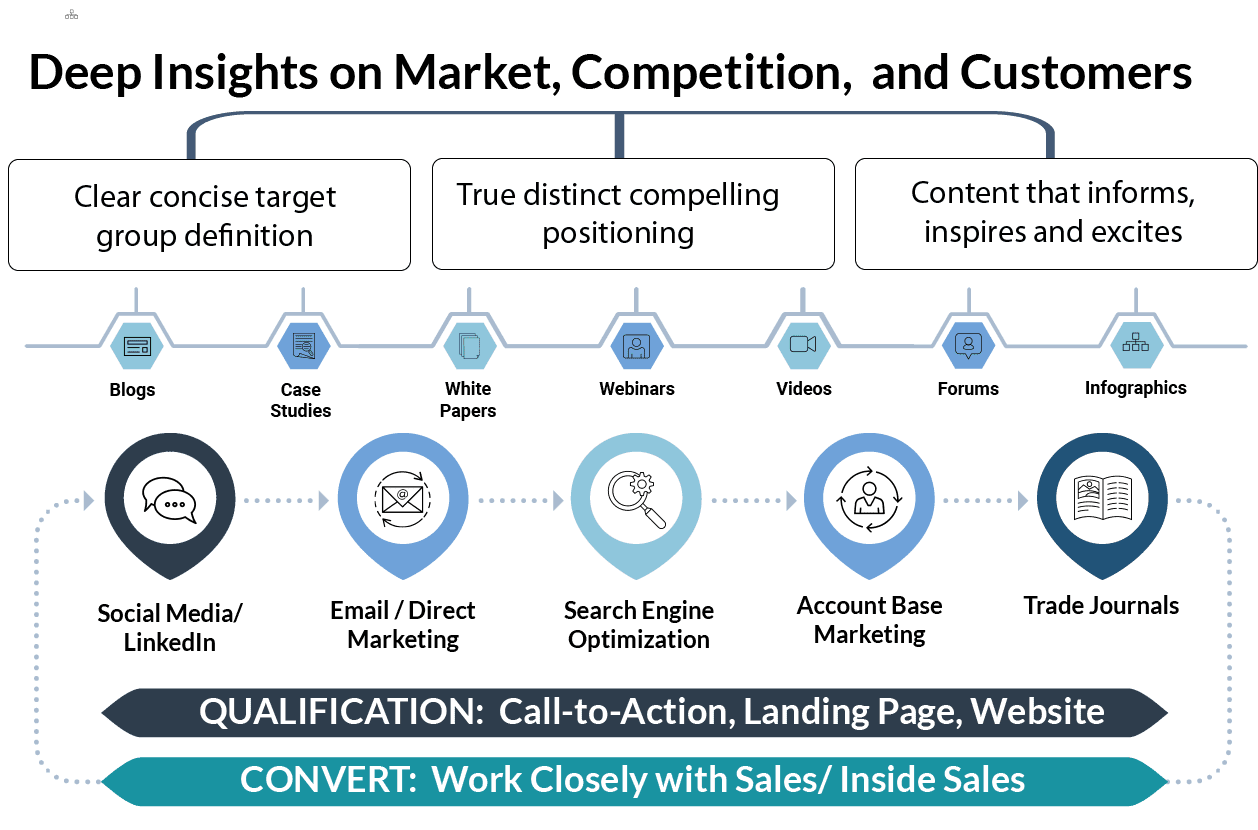All of the marketing trends with none of the industry jargon.
Sign up for our newsletter to stay updated on best practices, actionable tips, and virtual events so you can grow your business like a marketing pro.


An expert marketing team led by a highly experienced Fractional Chief Marketing Officer (fCMO) can be the right answer if you are not ready or don’t want to spend the money on a full team. This is ideal for start-ups ready to scale up and small to mid-sized businesses that want to accelerate growth.
Here are five indicators that you may want to hire a Fractional CMO working with a group of subject matter experts. This strategy ensures a data-based marketing plan grounded in a deep understanding of your market, competitors, and customers. It also effectively executes marketing programs and initiatives to give you a better return on your investment.
In many smaller companies and start-ups, the CEO or the sales leaders do marketing “on the side.” They may have some administrative help, but marketing is not a primary focus. They may be sending emails to customers, preparing marketing materials, or even writing blogs, but this is not likely very effective. The messages shared by these marketing efforts tend to be scattered and confusing.
In addition to marketing strategy, our team can help you develop a focused brand image and message that you can effectively communicate through marketing materials with a unified and recognizable brand identity.
You may want to hire a Fractional CMO if you believe that an investment in marketing can accelerate your company’s growth trajectory or if you are ready to scale up. Investing in marketing without executive-level leadership and subject matter expertise will reduce your likelihood of success and diminish your return on investment. These teams offer the experience and practices used by larger companies and have experience with a variety of clients and industries.
Often companies are stuck within their own walls and ways of doing business. Apply outside perspective in developing and executing marketing strategies and programs to accelerate your growth. Executives with decades of experience in other similar situations can provide insights on what is more likely to work in your business or industry.
Many companies often deploy a hodgepodge of marketing tactics without a methodical, systematic approach. However, marketing is as much an art as a science. Proven processes that have been repeatedly successful in other situations can dramatically increase your chances of success, usually at a lower cost.
Our teams are highly data-driven and use data on key performance indicators to measure and drive marketing results. Empowering you with a deeper understanding of your market, competition, and current/potential customers is our starting point in developing the right marketing strategies for you. This is followed by execution processes all the way to working with your sales force to ensure that leads generated are quickly followed up.
Many businesses do not need, and cannot afford, a full-time CMO with a large marketing department. An investment like that is a significant commitment and can be expensive, especially for smaller businesses and start-ups. You should commit to this only if it is absolutely necessary. If you hire a Fractional CMO with a solid team, they can deliver the same value for a fraction of the cost.
If you’re wondering what to look for in a Fractional CMO candidate, here are a few characteristics of successful fCMOs:
A successful fCMO has experience across a variety of industries and situations, so they know which winning strategies are likely to work for your business. They also know how to use their leadership skills to guide the execution and deployment of those strategies, ensuring that projects focused on short-term results still tie into the overall strategy. They will also guide you in choosing metrics and KPIs that clearly demonstrate progress toward that strategy.
A good fCMO should come prepared with a proven set of winning processes and procedures. They should have the flexibility to tailor those processes to your organization’s unique needs, empowering you with the tools to reach the vision outlined in the overall brand marketing strategy and sustain long-term growth. A modern Fractional CMO also has a working knowledge of the ins and outs of digital marketing.
Great fCMOs act as an extension of your team, working “in” the business, fully integrating with a high level of attentiveness and investment in your company’s goals and culture. They focus on results, driving teams to fully close the loop from strategy to execution, ensuring projects are fully realized to the highest level possible.

Good marketing builds your brand, creates awareness, generates leads, attracts new customers, and accelerates your growth. Finding a way to do the absolute best marketing you can is critical, especially when times are tight. Hiring a Fractional CMO with a solid execution team may be a smart way to go. Plus, you can add people and capabilities as you grow. At the right time, we will help you transition by developing the right organizational structure while helping you hire the right people. For &Marketing, this transition is a sign that we have been successful. Contact us today to start driving growth with a Fractional CMO.
&Marketing provides the robust outsourced marketing department growing companies need without the high overhead costs of big agencies or full-time employees. Our variable model empowers businesses to reach their growth goals through access to the guidance and expertise of senior level strategists and a flexible execution team.
Are you facing challenges of your own in generating leads and meeting your business’ growth goals?
We’d love to learn more about your challenges and how a coordinated marketing approach might help take your organization to the next level.


This post was originally published at https://www.demandrevenue.com/cmos-what-kind-of-conductor-are-you-jazz-classical-or-both/.
Hopefully, as a CMO, you like an eclectic mix. Today’s CMOs need to be holistic conductors, balancing creativity with precision. You need a good balance of both to be really successful in today’s complex market. Let’s listen:
Being innovative and building strong connections with customers and prospects is like jazz. Remember Louis Armstrong, Miles Davis or Benny Goodman? Jazz requires expressing your creativity, using your gut, developing audacious breakthrough ideas, and taking risks to connect with target audiences in a really memorable way. They won’t remember numbers as much as how you made them feel. You won’t get big ideas from spreadsheets, either. Creativity requires you to:
Precision requires process, logic and consistent orchestration like the mathematically consistent phrasing in classical music. Remember Vivaldi, Bach or Handel? Over the last several years, digital and social media have enhanced the measurability of marketing’s impacts and value to the enterprise. Effective data analytics and process management are critical to lead efficiency and continuous improvement in today’s marketing organizations. To enable precision, you must:
So start making some beautiful jazz as well as classical music. Blending strong creativity with precision makes you a better marketer. It’s impossible to quantify creativity except in the rear-view mirror. And you can’t run an efficient marketing operation without the precision that data analytics and technology afford. Balancing both makes marketing far more interesting, effective and fun.
Alan Gonsenhauser, Founder and Principal of Demand Revenue, is an experienced CMO and general manager, and more recently as a CMO Executive Advisor and Analyst at Forrester and SiriusDecisions. He now offers Interim / Fractional Marketing Leadership, CMO Executive Advisory and Coaching, and Keynote Presentations, bolstered with comprehensive Strategic Marketing Services.
&Marketing provides the robust outsourced marketing department growing companies need without the high overhead costs of big agencies or full-time employees. Our variable model empowers businesses to reach their growth goals through access to the guidance and expertise of senior level strategists and a flexible execution team.
Are you facing challenges of your own in generating leads and meeting your business’ growth goals?
We’d love to learn more about your challenges and how a coordinated marketing approach might help take your organization to the next level.


As a business owner or a senior leader in a growing company, asking for help can be hard. There’s a certain expectation and pressure you feel to have all the answers. Perhaps you launched your own business and are out to prove that your vision is a viable one. You want to show that you’re capable of making it a success.
What we’ve learned, though, is that vulnerability – even for the most esteemed professionals – is a part of life. It’s okay to not know everything and, importantly, it’s okay to ask questions (we wrote about this in our ABCs of What We’ve Learned So Far at &Marketing blog series under the letter “V”). If we don’t seek advice from others, we are limited to our own thoughts and perspectives, which hinders innovation. Without a trusted source of counsel, there is no growth.
One common challenge that many of our clients, partners, and friends in senior leadership positions struggle with is where they can find sound advice. As an entrepreneur and small business owner who founded a startup just a couple of years ago – and as someone who gives advice for a living – this is a challenge to which I can certainly relate. The good news is that if you’re actively seeking advice, you’re doing the right thing. The success we’ve seen at our company would not have been possible without the input from several trusted people. The question is though, where should you go for advice? And which advice should you take seriously, and which should you ignore? I’ve pulled together a few suggestions to help you be more thoughtful about where you source insight.
Besides being slightly humorous, the above quote is not always true. However, it sometimes is completely true, and it’s hard to tell the difference. Informally, we all get advice from those around us – our family, our employees, our customers, and the people we meet in less formal professional and personal settings. How many of us received unsolicited advice on our business at a social setting that was completely off the mark? This is the type of advice you may want to ignore.
Here are some questions to ask yourself:
Do they speak from experience? Do they know my industry or challenge?

Do they have a full understanding of my business?
Does their advice align with our company’s vision?

Do their suggestions reflect current trends and ways of working?

Are they biased in any way?

Do they have an agenda? Is there something in it for them?
This concept has been around for a while, but I heard it most recently from podcaster Lewis Howes, and I love his words:
“You are the mathematical average of the five people with whom you spend the most time. So, choose carefully.” – Lewis Howes
We are in control of the people from whom we receive input and who we allow into our mind-space. If people are giving you bad advice, why do you continue to listen to them, let alone allow them in your inner circle? Sometimes we all need to take a step back and assess the people with whom we share our time. Your “five” should share your values and vision. Don’t get me wrong, though – you shouldn’t always ignore critics. Facing a harsh reality, or learning to think about things from a new lens, is how we make progress – so allowing a counter-perspective can be extremely valuable. But ensure your confidants have your best interests in mind, and that they speak from a place of experience that is valuable to your situation.
In helping clients with strategic guidance over the years, answering the following questions is a great first step:
What is your organization’s vision?
What are your goals for the year?
What challenges do you currently face, or what might you face in the future?
Upon whose advice should I rely?
Then, map out who might have the right insight for you:
Former colleagues, mentors, or managers. They tend to know you very well, including both strengths and weaknesses.
Subject matter experts. They may know your industry, a particular function, or important trends very well. They can help you ‘see around corners’ or identify blind spots in your thinking.
Other business owners (or people in similar roles at other companies). They can likely relate to the day to day struggle of your role and the unique associated pressures. I regularly speak to direct competitors about the challenges of managing and growing a team, working with difficult clients, and maintaining sanity.
Suppliers and vendors. Quite often, those who rely on you for their livelihoods have a wealth of knowledge.
Customers. By creating a mechanism to engage your customers as peers, you can learn quite a bit about how to better serve them. One way to ensure these customer interactions are outside of the day to day transactional nature of your relationship is by creating a customer advisory council. We have written extensively about how to go about launching a customer advisory council and the Dos and Don’ts of a Customer Advisory Council.
Team members. Don’t limit yourself by only looking externally. The big brains that are already at your fingertips may cherish the opportunity to think bigger about your business.

Mini Case Study
Recently, we helped a company looking to break out of stagnancy create an ‘advisory board.’ Their leadership team had grown the business from nothing over the past decades, but had no exit plan as their retirement drew nearer. We helped them create an advisory board to help them optimize their business processes, grow their top and bottom lines, and prepare for transition. Based on these needs, this group ended up being populated by:
a former customer, who had retired but had first-hand knowledge of the buying criteria in the industry (and a huge personal network);
a retired VP of sales who worked with our client and provides advisory services to others in the industry;
a former CFO who had relevant experience in optimizing similar companies’ product assortment by driving standardization;
an expert with experience in the private equity space who could help identify potential existing options.
If you don’t already have people in your network to reach out to for advice and mentorship, here are some tips based on my experience:
Request referrals or introductions. If you already know someone in your prospective advisor or mentor’s network, ask if they’ll make an introduction. Many successful people in senior-level positions receive regular requests for advice. The name recognition may catch their eye in their inbox and up your chances of them reading the email. It may also establish credibility and build trust.
Listen first and ask questions. If you have been introduced to someone by a colleague or friend, make the effort to learn about the person and their business. Don’t dive head first into asking them for something. Ask questions about their thoughts and approach.
Make it a win-win. Don’t look self-serving. Figure out how you might be able to help this person in return. Often, formal advisory requires compensation.
Do your research. If you already have a specific person in mind that you’d like to connect with, don’t go into it blindly. Treat it like a job interview. Find as much background as you can on the individual’s experience and their business. Ask others. This will also help you determine if they’re the right fit for you.
Don’t discount “gut feel.” At first glance, those you believed would be your best potential advisors may not be the right personal fit. Personality and fit matters if you are going to rely on this person’s ongoing support and advice.
Make your message clear. While you don’t want to be too aggressive with your ask, be transparent about what your goals are the specific questions you have for them. This is especially important if you’re reaching out via email or LinkedIn. Make it easy for them to quickly understand what you’re seeking. If they have to “decode” your message, it may frustrate them, which makes a bad first impression.
In our tech-driven world, markets and customers are constantly changing. To help keep up, you need to think outside of your regular networks of suppliers, vendors, employees, friends, etc. You may not get the winning answer or solution you’re looking for right away, but an outside perspective will get your brain thinking in ways it wasn’t before, and could eventually help you come up with that next big idea.
If you’re seeking advice related to marketing, we’d be happy to help. We’d love to learn more about your business and how we can work together to help it grow. Contact us for a free consultation!
As the founder and Managing Director of &Marketing, Rajat “Raj” Kapur strives to provide growing businesses of all sizes unparalleled marketing strategy and execution services. Raj brings nearly two decades of professional experience in marketing, sales, and strategy development experience spanning B2B and B2C Fortune 50, mid-sized, and startups.
In today’s fast paced world, many growing businesses are struggling to modernize their marketing approaches because either they don’t have the expertise or the bandwidth to do it themselves.
&Marketing provides seasoned marketing strategy professionals and a nimble execution team to help our clients achieve their goals. Our unique partnership model allows us to augment our client’s existing teams or outsource the entire marketing function in an affordable, flexible, and transparent way.
Recent Comments